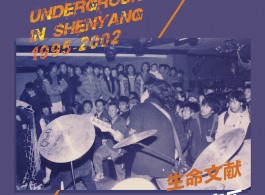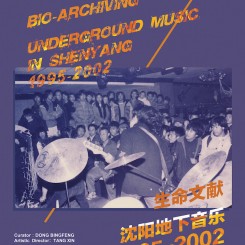3.17/2016 - 5.14/2016
Opening: March 17, 16:00
Curator: Dong Bingfeng
Artistic Director: Tang Xin
Artists: A Bai, Dong Bingfeng, Fu Duo, Gao Wei, A Boy in Thirsty, Ma Zhongren, Malignant Tumor in the End of Days, Bad Temper Commune, Dead Pills, Xiao Han, Zhao Guoxin
Archive Providers: Chen Huanzhong, Gao Wei, Li Lin, Ma Shang, Ma Zhongren, Xiao Han, Xu Xiaobing, Yang Rui, Zhao Guoxin
Extensive Reading List: Wall & Water Bookstore
【Symposium】
Back to “Locality”: Rock Music, Art and Cultural Politics in the 1990s
2016.3.17, 14:00-16:00
Venue: Taikang Space
Moderator: Dong Bingfeng
Guest Speakers: Li Juchuan, Jeph Lo, Ma Zhongren, Colin Chinnery, Su Wenxiang
【Exhibition Briefing】
Rock music as a genre emerged in China during the 1980s, asserting doubt and defiance towards banality and the bonds of tradition, and seeking to establish individualizing, self-confirming generational values. The history of Chinese rock ‘n’ roll has witnessed an era of brilliance and radical advances, albeit marked, in spatial coordinates, by uneven development and scattered centers of activity. Among these, Beijing, as the locus of economic, cultural and social circuits, undoubtedly comprises the most striking chapter in the legend of Chinese rock music. However, beyond this dominant, singular narrative, what are the possibilities to expand this story, to introduce alternative experiences and individual narratives? In response to this challenge, Bio-archiving: Underground Music in Shenyang 1995-2002 conducts a survey of the underground music scene in Shenyang from the mid 1990s to the early 2000s. The result is a sample of the variety of occluded histories dispersed in secondary and tertiary cities, where these memories, once vivid, silently endure in long-forgotten venues, never catalogued in archives or recorded in publications.
As the first exhibition held at Taikang Space in 2016, based on an extensive archive in different media and forms, Bio-archiving: Underground Music in Shenyang 1995-2002 renders a specific instance of the localized emergence of rock music and delineates a comprehensive, dynamic vision of its birth and growth. The exhibition is positioned as a supplement/extension to Taikang Space’s independent problematics, investigative and narrative methodologies, and production of visual knowledge.
In terms of disciplinarity, the interactive relationship between music and the visual arts has long been seen as an important object of analysis in the cultural studies field. A case in point is avant-garde music, which enjoys broad interconnections with the complete spectrum of contemporary arts in terms of concepts, methods, and even specific forms. As long as traditional ideology in this country was shaken by rock music in the name of liberation, nothing could stop the young generation of artists from devoting themselves to the free experimentation of a ‘new’ art. Since the 1980s, a number of Chinese avant-garde visual artists have initiated practices inspired by the audio experience of rock ‘n’ roll, while rock musicians have stepped forward into the field of experimental art. Visual artists have frequently engaged in the live music scene while musicians have enthusiastically developed their potential in visual art. In the specific case of Shenyang’s underground music scene, one can observe the dissemination of new music, contemporary art and avant-garde thought originating in Beijing, which contributed to the flourishing of underground live music performances, independent film screenings and alternative visual art exhibitions. All of this constitutes an alternative face for Shenyang as a city of heavy industry.
Curated by Dong Bingfeng, the exhibition showcases a vast body of materials, including tapes, videos, photos, publications, brochures, posters, invitations, and letters. As an active participant, Dong tries to render a survey of a localized culture within a given structure of space and time, and finally to present its significance in a broader sense of lived memories. The archaeological investigation of a specific cultural landscape helps us to understand history and memories as a whole, including the various activities instituted in the social space, and the numerous disjunctures, mutations and continuities which together inform the cultural present.
【About Taikang Space】
Taikang Space is a non-profit art organization founded in 2003 by Taikang Life Insurance Ltd, with the concept of “retrospection and encouragement”, it showcases thoughts and evaluations in the field of contemporary Chinese art, by which it aims to build a platform that provokes the artists’ potentials and in-depth research and exchange.


